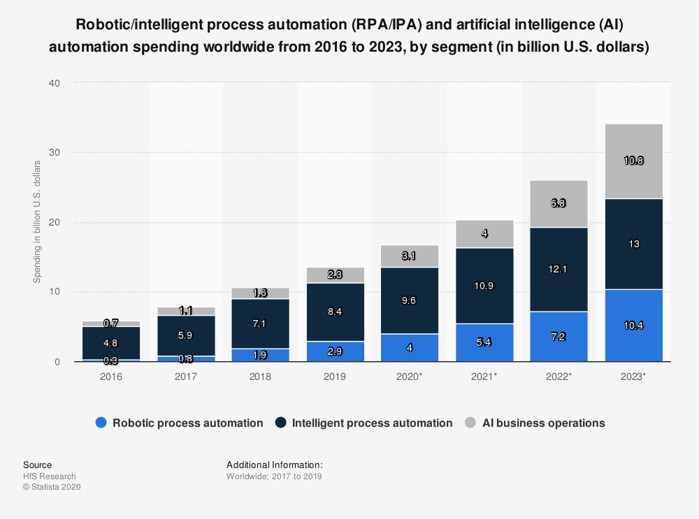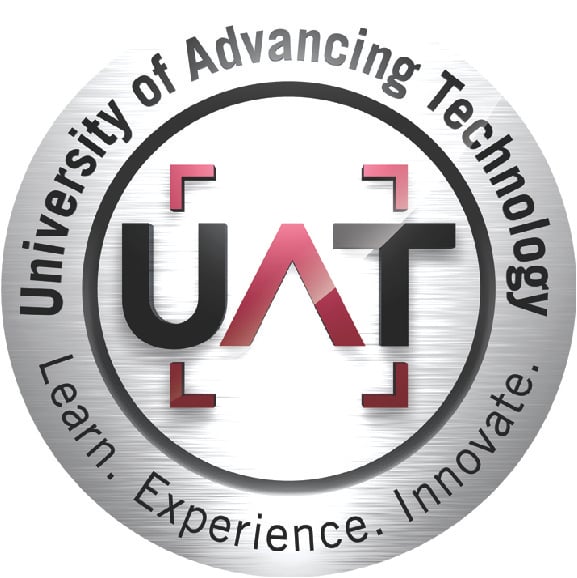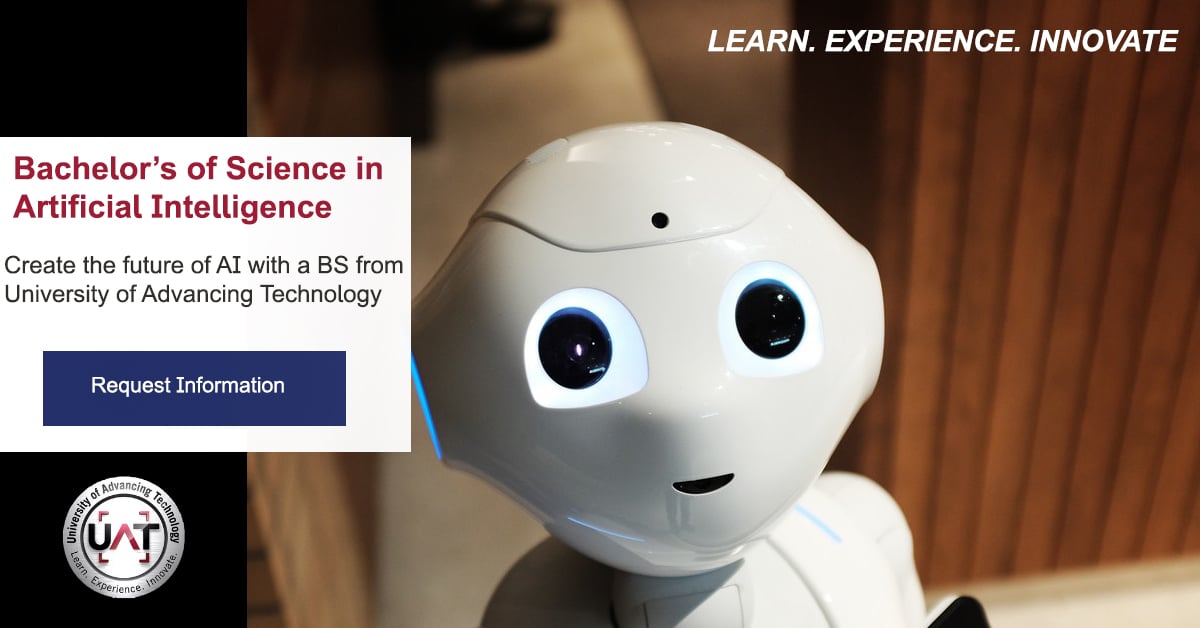Since artificial intelligence (AI) is spurring ongoing advancement in the information technology field, there’s never been a more valuable time to consider a degree in AI than today.
Nestled in the intersection of software engineering and computer science, AI is the branch concerned with building smart machines that can do tasks that historically have required human intelligence.
While the technology is very advanced, you don’t need to be working in a lab to encounter AI. Instead, these “smart devices” have trickled into mainstream consumer electronics, software markets, and more. Odds are, you encounter some of them every day, be it speakers, cars, phones, tablets, lights, or something else.
As artificial intelligence begins to percolate into our daily lives and the ceiling of AI’s capability continues to climb, today we’ll break down the reasons to earn an Artificial Intelligence Degree before looking at possible career paths that a B.S. in Artificial Intelligence from University of Advancing Technology could mean for you. Is a degree in artificial intelligence worth it? The answer is a resounding Yes!
Reasons to Study Artificial Intelligence
Globally, the AI software market grew 54% in 2020 and is projected to continue growing almost 40% annually from now through 2023. While this means the future for AI is undeniably bright, there are also other reasons to consider studying it.
Getting a great job might be easy with an AI degree, the major itself has a steep learning curve. Still, the value of the degree serves as motivation enough for many ambitious students who complete the major and reap a reward that far outweighs the invested time and effort.
Let’s look at some reasons why an Artificial Intelligence degree is so valuable.
-
AI is a booming future job market
This reason closely follows the projected growth of AI usage: if AI is becoming progressively more mainstream, then there will be more and more positions for AI-trained professionals to help integrate advanced science into more common practices of business and culture.
On top of this, more companies are integrating AI into their work. The annual amount of AI business operations spending is increasingly growing. In 2021, there will be an estimated 20 billion dollars spent globally on robotic/intelligent process automation, and that number is projected to become almost 35 billion by 2023. Most of this spending is going toward automation, and while this might reduce the number of human jobs at some of these companies, it will create an even greater demand for Artificial Intelligence degrees to aid in the process.

In fact, many experts consider AI jobs to be future-proof, meaning they will survive well in the years to come. The demand will certainly exist for these jobs, too, especially seeing as only 23% of businesses had incorporated AI into their process and product/service offerings by 2019. As more companies begin the incorporation, the number of jobs should skyrocket.
-
…And the hottest job of TODAY
While the future of careers in AI shines bright, perhaps even more importantly, AI job prospects are sky-high right now. During its annual Emerging Jobs Report, LinkedIn named Artificial Intelligence the top emerging job for 2020.
The numbers alone speak for themselves: hiring growth for artificial intelligence specialists grew 74% annually in the four years leading up to the 2020 report – nearly 35% more annual growth than number two on the list, robotics engineering.
Given this ongoing spike in demand, a degree in AI transforms your hunt for a great job into great jobs hunting for you.
-
AI jobs are becoming increasingly more versatile
In its early years, AI was closely associated with only two industries: computing and space exploration. While these are industries still are heavily dependent on AI, many other industries are also sprouting with ample AI opportunity as a result of both the AI crossover into consumer electronics and the push for AI automation in production. These industries include banking, healthcare, cybersecurity, manufacturing, finance, automotive, and more. Across all industries, an estimated 133 million new jobs will be created by AI demand by 2022.
Don’t fall into the stigma of thinking AI will limit your potential industry of employment. If anything, AI is one of the most diverse degrees of today.
-
AI Engineers benefit society as a whole
Lastly, a degree in AI is your ticket for a seat on the train that’s pulling society forward. The ample opportunity of AI degrees – along with the high-paying jobs – might be an allure of their own, but perhaps the greatest reward of AI work is how, in many ways, it is advancing the human race.
AI has enabled a technology boom over the last decade, and a degree in Artificial Intelligence will arm you with the skills to be an innovator and forward-thinker capable of issuing in the future of humanity and a better way of life for people around the world.
While it’s convenient to ask Alexa what the weather is like for the day, AI is doing more impactful things, too. For example, AI is currently being integrated into healthcare as a way to help diagnose patients or second-check diagnoses to help expand the effectiveness of the industry.
If you want to be a part of this push, a degree in AI is a great first step.
Top Career Paths connected to Artificial Intelligence
If these reasons have you considering a career in AI, that’s excellent! Now, with that in mind, let’s look at some of the possible career paths of an AI engineer.
But first, understand that “AI Engineer” is a customizable skillset, not a standard one. In other words, students studying AI will be able to cater their education – and therefore their career – to the areas of the field they find most compelling. For example, some specific focuses of AI included machine learning, perception and language, human-AI interaction, and decision-making.
While this opens the door to lots of possible careers, the four most common occupations in the AI field are machine learning engineers, robotics engineers, computer vision engineers, and data scientists. According to an Indeed report, all four of these occupations have seen massive growth over the last five years, led by machine learning at over a staggering 340%.
Here’s an overview of the top 4 AI careers:
- Machine Learning Engineers not only earn a higher pay than most, but they help design software capable of “learning” on its own to help automate unpredictable models. Working alongside data scientists, machine learning engineers build out theoretical models that help crunch enormous amounts of data in real-time. In other words, this job uses data modeling to help find patterns in high volumes of data or predict unseen circumstances. In some ways, machine learning engineers are helping predict the future!
- Robotics Engineers are also popular positions for their pay scale, a robotics engineer’s job is to develop machines that perform functions much like that of humans. This can apply to almost any industry and at any level of use, from common consumers to government intelligence. This job is perfect for the innovative computer scientist, allowing him or her to not only flex technical skillsets – but also creativity.
- Computer Vision Engineers are in demand for doing work that – as the name implies – helps computers “see” images, process them, and learn. This data can include movement, distances, and movements. Much of the work done by computer vision engineers has a forward-facing impact on everyday life. For example, if your car has a rear-view camera that helps you park, this was developed by computer vision engineers.
- Data Scientists are also growing in high demand and outlook throughout every industry for doing a job heavily based on collecting, analyzing, and interpreting massive sets of data. They often work with machine learning engineers to help develop algorithms that clean the data for analysis. Once the analysis is complete, data scientists will then work to develop data-driven solutions to business problems from many fields. A specific skill set is required for this line of work, but it’s also a very versatile career and can lead to many industries of employment.
Ready to pursue your degree in Artificial Intelligence? Here’s what comes next!
If the value and possible career paths of an Artificial Intelligence degree have you ready to take your first steps toward this potential future, we’re here to help.
University of Advancing Technology offers a cutting-edge B.S. in Artificial Intelligence that is part of our Software Engineering degree family. The degree explores the theory and practice of engineering tools that simulate thinking, patterning, and advanced decision behaviors by software systems. Our major also teaches students to build software systems that solve complex problems as we prepare graduates of today to become innovators of tomorrow.
When you’re ready to begin this journey for yourself, be sure to further explore our degree, and don’t forget to request more information!






Comment